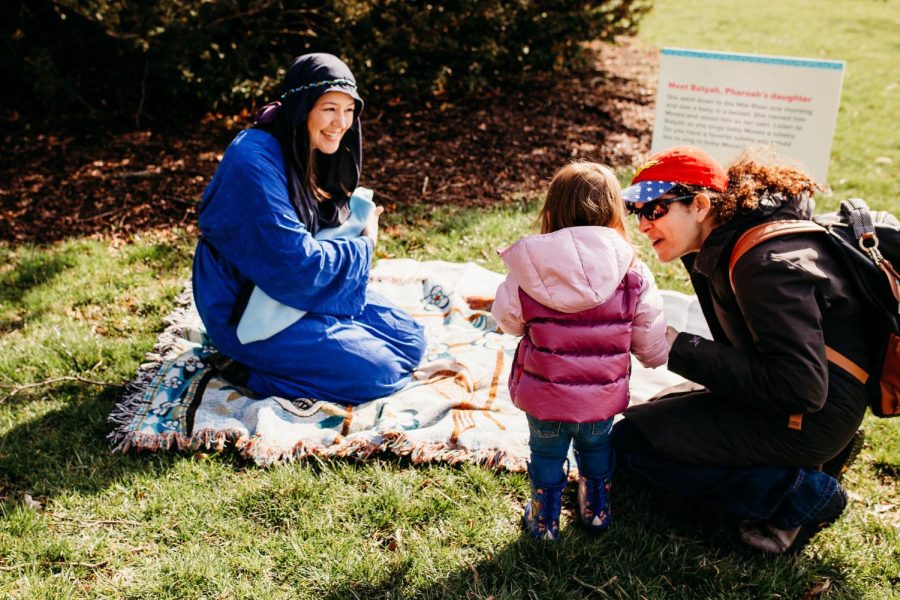‘Darkness and hope and light’: Evanston, Chicago Jewish communities unite for Passover 2022
Jewish United Fund’s Young Families program hosted an outdoor Passover celebration on April 3 at the Morton Arboretum. The organization is one of many seeking to bring Chicago-area Jews together during Passover, especially following two years of strict quarantines that prevented holiday gatherings.
April 14, 2022
When Rabbi Ari Hart and his congregation at Skokie Valley Agudath Jacob synagogue began hearing news about Russia’s recent invasion of Ukraine, Hart said he felt sending aid to refugees was not only the right thing to do — it was true to the spirit of Passover.
”It’s a holiday about personal liberation and freedom,” said Hart. “But it’s also meant to turn our eyes outward, and to look into the world and see, where is there oppression? Where is there suffering, and what can we do to respond to it?”
Skokie Valley has worked to fundraise and send medical supplies to Kyiv in an effort to help alleviate the crisis and is also hosting an open seder — a ritual Passover dinner at which the history of the holiday is retold — on Friday evening that is free to attend.
Skokie Valley is one of many synagogues around the world that hold Passover celebrations to commemorate the story of the Jews’ exodus from Egypt. The holiday is observed for seven to eight days, depending on a person’s denomination of Judaism, which often corresponds to their location. For local Jewish leaders in the Evanston area, this year’s celebration presents an opportunity for families to unite after two years of stricter quarantines.
Dara Cameron (Communication ’06), a program associate with the Jewish United Fund’s Young Families program, said her organization focuses on supporting Jewish families with children. The Chicago-based group has worked hard to balance the pandemic considerations associated with school-aged children, family gatherings and travel restrictions.
“This is the third year that we’ve had to find creative solutions to celebrating (Passover),” said Cameron. “It’s a holiday that’s all about gathering together around the table and sharing food and being with your loved ones, and so, certainly this year, we are really grateful.”
Cameron said within JUF, the Young Families program prioritizes “hyperlocal” events, such as a “chocolate seder” they hosted in Evanston last Sunday where children could celebrate by substituting traditional seder dishes for sweets. These events provide a space for Jewish children in the Chicago area to meet others living nearby, she said.
Young Families’ biggest Passover event this year was a celebration at the Morton Arboretum on April 3, which involved an outdoor re-enactment of the story of Passover, along with live music and crafts. Keeping this event outdoors was a priority for organizers, Cameron said, especially as a group that serves families and unvaccinated children.
“Kids under five, which we cater a lot to in our department, aren’t vaccinated yet,” she said. “Young families, young parents with young kids are still very hesitant to gather in large groups.”
Rabbi Joseph Ozarowski, the rabbinic counselor and chaplain of JCFS Chicago, said he also centers safety and support for Jewish communities most affected by the pandemic within his organization’s activities and events. JCFS helps provide a range of programming for Chicago-area Jews, with a focus on accessibility and providing support for those experiencing illness, disabilities, loss or addiction.
Though the organization will not hold events during Passover itself, Ozarowski said he recently led a support group, the Empty Chair, on how to navigate Passover following the loss of a loved one. JCFS has also focused on programming for senior citizens ahead of the holiday.
“When we’re reaching out to seniors, we will acknowledge their place,” he said. “In Judaism, seniors are considered sages — we look up to them. They’re often marginalized in our society today.”
Ozarowski noted how the complexity of navigating Passover in the continuing pandemic continues reflects the themes he sees in the Passover seder: “Slavery and freedom, bitterness and sweetness, darkness and hope and light.”
“We haven’t fully processed all the losses we suffered, not just the loss of people who’ve died, but the loss of so many things that we took for granted before COVID,” Ozarowski said. “There’s a feeling of hope in the air, tempered by the things happening in the world around us.”
Email: [email protected]
Twitter: @lilylcarey
Related Stories:
— Local Jewish organizations work to make keeping Passover more accessible
— Hillel supports student in quarantine with temporary Passover food options
— Local leaders respond to recent uptick in attacks against the Jewish community


